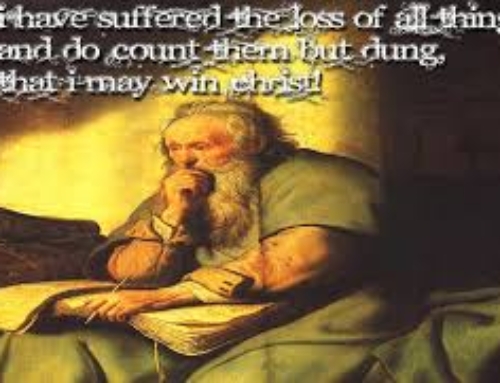This morning I sat across the table from a charismatic faith healer. He excitedly told a story of encountering a paraplegic in a park. As his story goes, back then, he was not yet mature in his belief that “it is always God’s will to heal; healing in this life is promised in the atonement; we just need to grow in faith to be able to receive it.” So, when he saw the man in the wheelchair, he couldn’t muster the courage to approach. However, after passing the man several times as he strolled his laps around the park, like a vulture circling his prey, he finally garnered the intestinal fortitude to descend upon the man and offer to heal him in Jesus’ name.
The man welcomed the idea. So the faith healer took off on what would be his first adventure in trying to offer the prayer of faith. He prayed and prayed. But the man wasn’t healed. The faith healer was temporarily disheartened. What he saw with his eyes didn’t seem to match what he believed in his heart. As the faith healer eventually got in his car and drove away, he comforted himself with a thought: “I could see in the man’s eyes that I offered him hope of being healed and that was what he needed that day.” I wonder if the look in that man’s eyes changed as hope faded while he watched the faith healer drive off into the distance.
Another proponent of this kind of faith healing, Steven Furtick, the popular pastor of Elevation Church, wrongly interprets Mark 6:5 in a way that lends itself to incidents like the one in the park. Says Furtick,
“The power of God was in Jesus, the healing power of God, the restoring power of God, the same power that made demons flee was in Nazareth, but Jesus could not release it. Because it was trapped in their unbelief. And there’s one thing that even Jesus can’t do. One thing that even the son of God can’t do. Even Jesus cannot override your unbelief. I see y’all looking at me like, ‘Is that true? I thought He could do anything.’ It said, ‘He could not.’ He wanted to. He was prepared to. He was able to. The power of God was in Nazareth, but it was trapped in their perspective.”
The Greek word in Mark 6:5 is edynato, which is a negation of dynato, meaning power. Edynato does indeed mean “to not have the power” or “to not be able”. But in what sense? Hebrews 13:8 teaches us that “Jesus Christ is the same yesterday and today and forever,” so there is never any want of power within Himself. He was every bit as powerful on that day in his hometown of Nazareth as He is any day and anywhere else in the Universe. We’re talking about the One through whom all things were made (Hebrews 1:2).
To be “not able” in Mark 6:5 referred to submission to the will of the Father, a will He also shared. It didn’t refer to subservience to the will of the men of Nazareth. It was the Father’s will in Mark 6 to pass over the wicked hearts of the people of Nazareth. Jesus “could do no mighty work there” only in the sense that God did not will to grace them with sign gifts to confirm Jesus’ messianic claim. His purpose was often to do miracles in the presence of faith, and in this particular case, He purposed to meet a lack of faith with an absence of miracles. It was His divine prerogative, not a constraint external to Himself, that limited Him from doing mighty works there.
Jesus didn’t marvel at their unbelief because His usually reliable superpowers were suddenly neutered by their kryptonite-like unbelief. Jesus marveled that the people who watched him for decades as He lived among them still didn’t recognize His true identity. Indeed, apart from the miraculous lifting of the veil (2 Corinthians 3:14-4:6), no one sees Him for who He is. It’s amazing how blind all people are apart from grace. The real miracle is that He ever chooses to open the blind eyes of underserving people like ourselves.
“Growing in faith to receive your miracle” is not a biblical description of spiritual maturity. Growing in faith does not mean increasing in ability to receive what God “wants to give” but which He is somehow prevented from giving on account of human unbelief.
Here’s a better definition of maturity: suffering well. God has dominion over all things, including our suffering (1 Peter 1:1,6,7,10-12, 3:17, 4:11, 4:19, 5:11). Suffering is for a little while, whereas glory in Christ is for eternity (1 Peter 1:4,13,24, 4:13, 5:10). Growing in grace by taking to heart apostolic teachings, like those of 1 Peter, is the true path to spiritual maturity.
Studying “the will of God” in 1 Peter is very helpful along these lines. “Thelema” is used 4 times (2:15, 3:17, 4:2, 4:19). The usages alternate between 2 different senses in which God has a “will”. The revealed will of God (2:15, 4:2) are the prescriptions of God that we are commanded to live by. These are the things that are revealed to us. It’s our job to obey His will, in this commanding sense of the word. The secret will of God (3:17, 4:19) refers to God’s decree. This includes everything that God has determined to come to pass. We don’t live with knowledge of such things (like the identity of the elect, the day of our death, whether or not God will heal a particular ailment). That’s why we call it the “secret” will of God, drawing on language from Deuteronomy 29:29. It’s our job to trust His will, in this sovereignty sense of the word (James 4:15).
Spiritual maturity means living according to the revealed will of God while trusting Him with His secret will. Rather than fretting all the time about whatever circumstances God will allow to come into our lives, maturity is concerned about pursuing holiness. Holiness is not an option, but a command, a necessity, and a joy (1 Peter 1:13-21, 2:11-12, 4:1-6). This, I think, is the kind of growth in the faith that Peter was concerned that we have. Grow in godliness by the pure milk of the Word (1 Peter 2:2).
My paralyzed Uncle Herb was, in my estimation, one of the most mature Christians on earth during his latter decades on earth. He never mustered faith to receive a healing. He trusted God’s plan, even where that plan included suffering. He remained joyful. He used to write out copies of the Bible by hand. He prayed unceasingly. He went around town in his wheelchair evangelizing whomever he could. He watched and waited for the second coming of Jesus. Strive for that kind of maturity.






